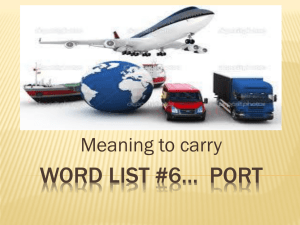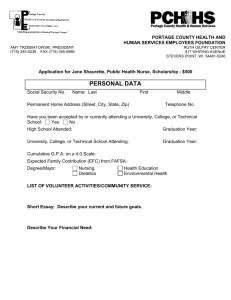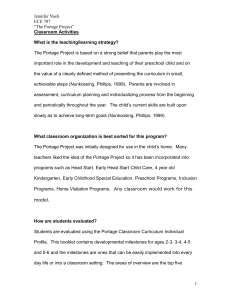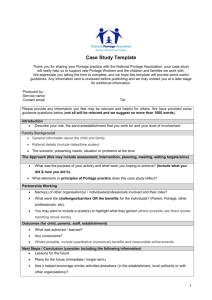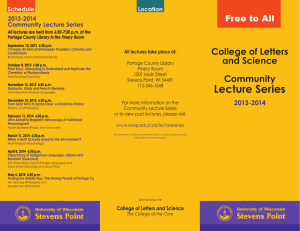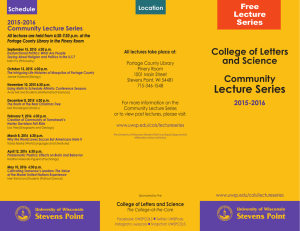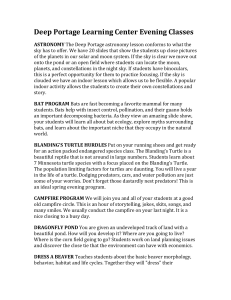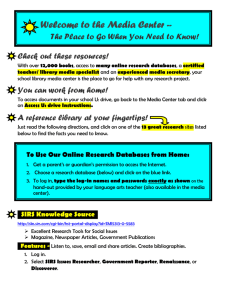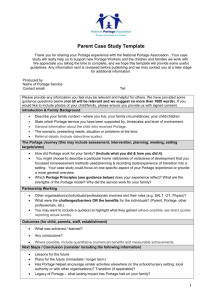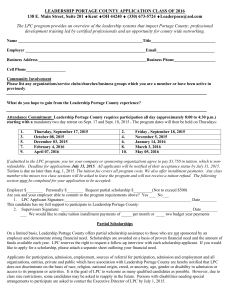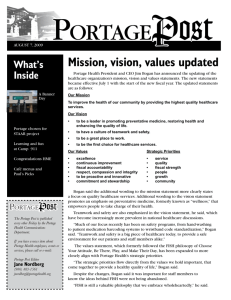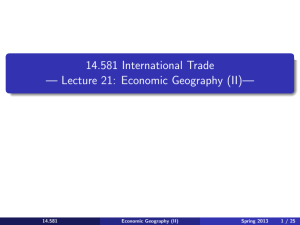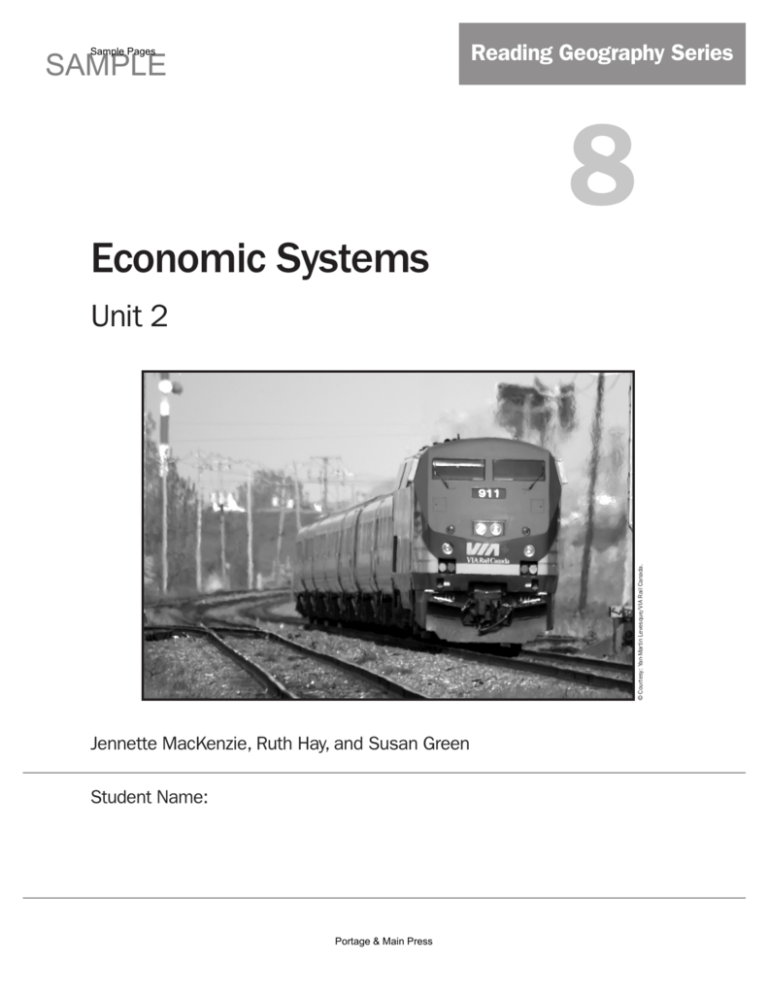
Reading Geography Series
SAMPLE
Sample Pages
Economic Systems
8
© Courtesy: Yan-Martin Levesque/VIA Rail Canada.
Unit 2
Jennette MacKenzie, Ruth Hay, and Susan Green
Student Name:
Portage & Main Press
SAMPLE
Sample Pages
© 2009 Jennette MacKenzie, Ruth Hay, and Susan Green
All rights reserved. No part of this publication may be reproduced or transmitted in any form
or by any means – graphic, electronic, or mechanical – without the prior written permission of
the publisher.
Printed and bound in Canada by Friesens.
The publisher has made every effort to trace copyright holders and obtain their permission for
the use of copyrighted material in this publication. If insufficient recognition has been shown,
please contact the publisher, below, so it can be corrected in the next edition.
Titles in the Reading Geography 8 series
Unit 1: Patterns in Human Geography
ISBN: 978-1-55379-205-5
Unit 2: Economic Systems
ISBN: 978-1-55379-204-8
Unit 3: Migration
ISBN: 978-1-55379-202-4
Teacher’s Guide
ISBN: 978-1-55379-206-2
Reading Geography 8 Set
ISBN: 978-1-55379-201-7
100-318 McDermot Avenue
Winnipeg, Manitoba, Canada R3A 0A2
Email: books@portageandmainpress.com
Toll Free: 1-800-667-9673
Fax: 1-866-734-8477
Portage & Main Press
SAMPLE
Sample Pages
Table of Contents
Anticipation Guide.................................................................................. 3
What Is an Economic System?................................................................ 4
Strategies for Learning: Monitor and Check
A Real World View: Economics @ Home................................................... 7
Characteristics of Economic Systems...................................................... 8
Strategies for Learning: Make Connections
A Real World View: Going “Green”......................................................... 11
Canada’s Mixed Economy...................................................................... 12
Strategies for Learning: Ask Questions
A Real World View: From Coast to Coast................................................ 15
Check Your Understanding.................................................................... 16
Study Notes......................................................................................... 17
Economic Resources............................................................................ 18
Strategies for Learning: Look for the Main Ideas
A Real World View: The Ripple Effect...................................................... 21
Types of Industries................................................................................ 22
Strategies for Learning: Make Inferences
Industrial Development in Canada......................................................... 24
Strategies for Learning: Summarize
Check Your Understanding.................................................................... 28
Study Notes......................................................................................... 29
Unit Summary...................................................................................... 30
Reflect on My Learning......................................................................... 31
Portage & Main Press
SAMPLE
Sample Pages
Anticipation Guide
In this unit, you will learn about economic systems and the factors that affect them.
Economic systems involve the production, distribution, and use of goods and services
in a country or a society.
Read each statement below and decide whether you agree or disagree with it. Jot
down your reasons for your decision. Do not fill in the last column until after you have
learned more information.
Statement
Agree or
Reasons
Disagree After
Reading
Your country and your family
have economic systems.
All countries have similar
economic systems.
The government controls all
business in Canada.
Canada depends on
natural resources for
economic success.
Canada’s economy relies
too heavily on service
Industries.
Industries change to meet
the needs of the market.
Reading Geography
Portage & Main Press
3
SAMPLE
Sample Pages
Strategies
Strategies for
for Learning
Learning
What Is an
Economic System?
As you read, monitor and check your understanding.
If there is a word that you do not know, read ahead
or read back to see if the text gives you clues. If
there are not enough clues, check the dictionary.
Underline any words that you find tricky.
Systems are used to help people organize the ways they live. For example, a computer
system organizes files. A transportation system organizes travel routes to make
moving from place to place easier for people. An economic system is no different.
It is the way that a society organizes its economic activities. The economic system
produces and distributes goods and services to consumers.
You likely have your own personal economic system. You have your own money and,
as a consumer, you decide which goods and services you will buy – whether to buy a
new pair of jeans or go to the movies.
Many decision-makers affect a country’s economic system. Governments and
businesses decide what goods they will produce and supply to consumers, and what
those goods will cost. Consumers demand the types of
products that they want and need. This is called supply
goods – things you can use,
and demand.
such as an MP3 player
Economic systems are structured in different
services – things that are done
ways. The type of economic system a country has will
for you, such as having your
depend on its type of government and its values and
car fixed by a mechanic
cultural traditions.
Gross Domestic Product
Measures the dollar
value of all goods and
services produced in a
country in one year
How Countries
Measure Economic
Activity
Gross National Product
Measures the dollar
value of all goods and
services produced by
a country’s citizens –
whether they live in the
country or not
Countries measure economic activity in two ways.
Remember…
An economic system produces, distributes, and consumes goods and services.
4
Portage & Main Press
Economic Systems
SAMPLE
Sample Pages
The development of an economic system is based on the following four questions:
1. What goods are produced?
© istockphoto.com
Every country has different economic resources. Canada, for example, has natural resources
such as forests and fossil fuels. China, on the other hand, is known for the goods it
manufactures.
Forests are one of Canada’s most important natural resources.
2. How are the goods produced?
Some countries use technology to produce goods. Other countries do not have the same
technologies and depend more on human labour to produce goods.
3. For whom are the goods produced?
Some countries produce goods mainly for use in their own country. Other countries produce
goods to trade with other countries around the world.
4. How are the goods distributed?
Goods can be distributed by transport trucks, trains, ships, airplanes, or by the Internet.
Remember…
The development of an economic system is based on four questions: What goods are produced?
How are the goods produced? For whom the goods are produced? How are the goods distributed?
Reading Geography
Portage & Main Press
5
SAMPLE
Sample Pages
When I read the words “economic system” in the first paragraph, I
didn’t really know what it meant. So I read on and it explained that
an economic system is the way a country produces, distributes, and
uses goods and services. The second paragraph also helped me by
comparing the economic system to the way I manage my own money
to purchase goods and services.
Think About Your Reading
1. When learning about a new concept or idea, it is helpful to think about it in
many ways – in writing, in drawings, and by comparing it to something you
already know. Complete the following graphic organizer to help you understand
economic systems.
A definition of economic
systems in your own words
A sketch or a symbol
Economic systems are like …
An example of an
economic system is…
2. (a) What words did you find hard to understand?
6
(b) Pick one of the words and explain how you figured out the meaning.
Portage & Main Press
Economic Systems
SampleW
Pages
orl
iew
AR
dV
l
ea
SAMPLE
What are the goods and services in your
family’s economic system?
Economics
@ Home
The original meaning of the word “economy” comes from the Greek word for “one who
manages a household.” Families use money in different ways. The adults in your family
bring money into the house to pay for what the family needs. Many families plan a
budget so that they can buy goods, such as groceries, and pay rent, as well as pay for
such services as the telephone, Internet, and electricity.
INCOME
ESTIMATE
$200.00
Wages
ACTUAL
$200.00 (part time job)
$20.00 (shovelled
DIFFERENCE
$20.00
snow for Mrs. Noth)
EXPENSES
Savings
Cell Phone
Gas
Clothes
Entertainment
(movies,dinner)
SUBTOTAL
INCOME
$20.00
$35.00
$50.00
$00.00
$25.00
$130.00
$70.00
$20.00
$35.00
$50.00
$15.00
$30.00
($15.00)
($5.00)
$150.00
$70.00
($20.00)
0
Jamal’s budget worksheet helps him to track how much money he thinks he will have every month
and how much he really makes. He can plan what he thinks he will spend on economic activities
and then look at what he really spent. After that, he can decide how much money he will put into
his savings account.
?
Make Connections
Think about your own family’s economic system. How is it the same as the
economic system of a country? How is it different?
Reading Geography
Portage & Main Press
7
SAMPLE
Sample Pages
Check Your Understanding
Pause and think about what you have learned. The following activities will help you
review your learning.
Check Your Vocabulary
In your own words, write a definition of the following terms:
economic system (page 4)
consumer (page 4)
supply and demand (page 4)
market economy (page 9)
mixed economy (page 9)
Check Your Reading Strategies
You used the strategies monitor and check, make connections, and ask questions
to help you understand the text. Which strategy helped you the most? How did it
help you?
Check Your Learning
Look back at the Anticipation Guide you completed on page 3. Reread your responses
for the first three rows. What did you learn about these that was new or surprising?
Would you change any of your answers? Why?
16
Portage & Main Press
Economic Systems
SAMPLE
Sample Pages
Study Notes
Use the two columns of the graphic organizer to help you remember what you have
learned. Take a blank piece of paper and cover the column labelled Details. Read
each item in the column labelled Important Ideas and write down the details about
each one. Remove the paper and check your answers.
Important Ideas
Details
Economic System • The way a country produces, distributes, and
consumes goods and services
Four Questions Economic Systems
Are Based On
• What goods are produced?
• Who are the goods for?
• How will the goods be distributed?
• How are the goods produced?
Four Kinds Of
Economic Systems:
Traditional
• Depends on the environment
• People grow the food and make the things they need to survive
• Past traditions determine decisions
• Controlled by government
Command
• No competition
• Limited consumer choice
• No government control
Market • Much consumer choice
• Competition
• Some government control (hospitals, road
Mixed building, police)
• Much consumer choice
• Competition
Reading Geography
Portage & Main Press
17
30
Portage & Main Press
primary (natural
resources)
shift over time from
primary to secondary
to tertiary
Industries in
Canada
land
Economic
Resources
capital
Economic
Systems
entrepreneurial
ability
secondary
(manufacturing)
tertiary (service)
Types of Industries
labour
government-owned
market
mixed
command
Economic Systems
traditional
privately owned
Canadian Economic
System
Goods and
services
Unit Summary: Economic Systems
SAMPLE
Sample Pages
Economic Systems
SAMPLE
Sample Pages
Reflect on My Learning
Three new things I learned:
1.
2.
3.
Two things I already knew:
1.
2.
One thing I still have a question about:
1.
Reading Geography
Portage & Main Press
31

